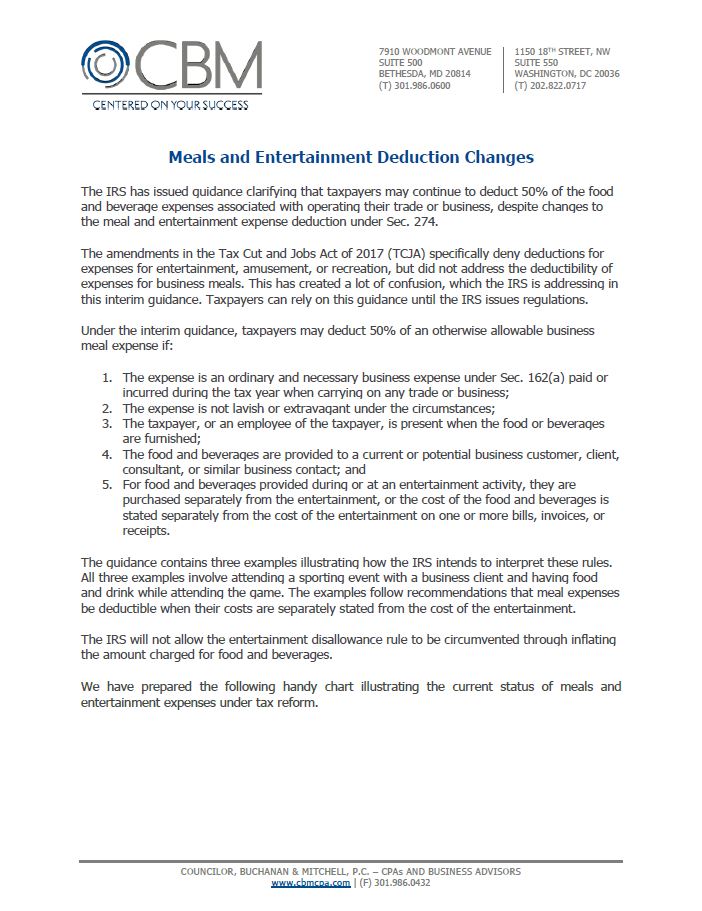The IRS has issued guidance clarifying that taxpayers may continue to deduct 50% of the food and beverage expenses associated with operating their trade or business, despite changes to the meal and entertainment expense deduction under Sec. 274.
The amendments in the Tax Cut and Jobs Act of 2017 (TCJA) specifically deny deductions for expenses for entertainment, amusement, or recreation, but did not address the deductibility of expenses for business meals. This has created a lot of confusion, which the IRS is addressing in this interim guidance. Taxpayers can rely on this guidance until the IRS issues regulations.

Click the image for a downloadable copy of CBM’s update on meals and entertainment deduction changes.
Under the interim guidance, taxpayers may deduct 50% of an otherwise allowable business meal expense if:
- The expense is an ordinary and necessary business expense under Sec. 162(a) paid or incurred during the tax year when carrying on any trade or business;
- The expense is not lavish or extravagant under the circumstances;
- The taxpayer, or an employee of the taxpayer, is present when the food or beverages are furnished;
- The food and beverages are provided to a current or potential business customer, client, consultant, or similar business contact; and
- For food and beverages provided during or at an entertainment activity, they are purchased separately from the entertainment, or the cost of the food and beverages is stated separately from the cost of the entertainment on one or more bills, invoices, or receipts.
The guidance contains three examples illustrating how the IRS intends to interpret these rules. All three examples involve attending a sporting event with a business client and having food and drink while attending the game. The examples follow recommendations that meal expenses be deductible when their costs are separately stated from the cost of the entertainment.
The IRS will not allow the entertainment disallowance rule to be circumvented through inflating the amount charged for food and beverages.
We have prepared the following handy highlights illustrating the current status of meals and entertainment expenses under tax reform.
Meals and Entertainment Deductions – Changes for 2018; Amounts Incurred or Paid Before January 1, 2018
Expenses Treated As Compensation.
Meals and entertainment expenses treated by the taxpayer as compensation paid to an employee are fully deductible.
Illustration: If an employer rewards an employee and spouse with an expense-paid vacation, the employer can deduct the expense to the extent the employer treats the expense as compensation and wages.
Status: Unchanged. Still fully deductible.
Reimbursed Expenses.
Meals and entertainment expenses paid or incurred by the taxpayer in connection with the performance of services for another person under a reimbursement or other expense allowance arrangement with that other person are fully deductible.
Illustration: A consulting firm agrees to charge a client fees plus expenses. The consulting firm is then fully reimbursed for expenses at the end of the engagement. The reimbursed expenses are fully deductible to the consulting firm.
Status: Unchanged. Still fully deductible.
Recreational, etc., Expenses for Employees.
The cost to an employer of recreational activities or facilities primarily for the benefit of his employees is exempt from the entertainment disallowance rules. Therefore, these expenses are fully deductible.
Illustration: Holiday parties, annual picnics, and company swimming pools, baseball diamonds, bowling alleys, and golf courses.
Status: Unchanged. Still fully deductible.
Items Available to the Public.
The cost to the taxpayer of goods, services, and facilities made available to the general public are fully deductible.
Illustration: A company offers complementary coffee and mints in its lobby.
Status: Unchanged. Still fully deductible.
Entertainment Sold to Customers.
Expenses by a taxpayer for entertainment aren’t subject to the 274(a) bar on entertainment expense deductions to the extent the entertainment is sold to customers in a bona fide transaction.
Illustration: The cost of producing night club entertainment (such as salaries paid to employees of night clubs and amounts paid to performers) for sale to customers or the cost of operating a pleasure cruise ship as a business will come within this exception.
Status: Unchanged. Still fully deductible.
Expenses Includible in Income of Persons Who Are Not Employees
The rule barring the deduction of expenses for entertainment, amusement, or recreation doesn’t apply if the recipient of the entertainment, amusement, or recreation isn’t the taxpayer’s employee, to the extent that those expenses are includible in the recipient’s gross income.
Illustration: Entertaining a nonemployee or an individual working for the taxpayer as an independent contractor. To gain the benefit of § 274(e)(9), the taxpayer must report the item on an information return.
Status: Unchanged. Still fully deductible to the extent that the expenses are reported as income.
Food and Beverage for Employees Classified as De Minimis Fringe
Food or beverage expenses that are excludable from the gross income of the recipient under §132(e) are fully deductible.
Illustration: Coffee, water, and snacks provided by the employer on the premises.
Status: De minimis fringe meals are now 50% deductible and will be nondeductible after 2025.
Food and Beverage for Employees for the Convenience of the Employer
The value of any meals furnished to an employee on behalf of the employer on the business premises are fully deductible.
Illustration: Meals provided by an employer for employees working overtime. Meals provided at a company cafeteria or dining room.
Employee meals provided on behalf of the employer are now 50% deductible and will be nondeductible after 2025.
Business meals with clients and prospects
Meals (no entertainment included) furnished for a client or prospective client are 50% deductible as long as the expenditures are directly related to or associated with the active conduct of the taxpayer’s trade or business.
Illustration: A partner at a law firm treats a potential client to lunch and discusses matters directly related to business between the two.
UPDATE: The IRS has clarified its stance on meals with business contacts. Taxpayers may deduct 50% of an otherwise allowable business meal expense if:
– The expense is an ordinary and necessary expense under §162(a);
– The expense is not lavish or extravagant under the circumstances;
– The taxpayer, or an employee of the taxpayer, is present;
“- The food and beverages are provided to a current or potential business customer, client, consultant, or similar business contact; and
– The food and beverages are purchased separately from any entertainment”
Employee Meals During Travel
Employee meals while away from home are 50% deductible.
Illustration: An employee’s meals that are ordinary and necessary expenses of traveling away from home.
Status: Unchanged. Still fully deductible.
Entertainment expenses
Entertainment expenses that are related to the active conduct of the taxpayer’s trade or business, unless otherwise stated, are 50% deductible.
Illustration: Sporting event tickets; expenses at night clubs, theaters, country clubs, and other purely entertainment related charges that are directly related to the taxpayer’s business and can be properly substantiated.
Status: All entertainment expenses are no longer deductible.
Employees, stockholder, etc. business meetings.
Expenses incurred by a taxpayer which are directly related to business meetings of his employees, stockholders, agents, or directors are 50% deductible.
Note: Meals are only deductible to the extent they are not lavish or extravagant under the circumstances. Also, the taxpayer must be present.
Illustration: An employer provides lunch to employees during a sales meeting.
Status: Unchanged. Still 50% deductible.
Meetings of Business Leagues, Etc.
Expenses directly related and necessary to attendance at a business meeting or convention of any organization described in section 501(c)(6) and exempt from taxation under section 501(a) are 50% deductible.
Note: Meals are only deductible to the extent they are not lavish or extravagant under the circumstances. Also, the taxpayer must be present.
Illustration: An employer provides lunch for a meeting with a real estate board which is exempt under 501(a).
Status: Unchanged. Still 50% deductible.
Membership dues.
Amounts incurred for membership in any club organized for business, pleasure, recreation, or other social purpose are not deductible.
Status: Unchanged. Still non-deductible.
Substantiation.
No deduction or credit is allowed under section 162 or 212 for any traveling expense (including meals and lodging)or for any expense for gifts without proper substantiation of such expenses. Substantiation requires adequate records of (1) the amount of such expenses, (2) the time and place of the travel or the date and description of the gift, (3) the business purpose of the expense or other item, and (4) the business relationship to the taxpayer of the person receiving the gift.
Councilor, Buchanan & Mitchell (CBM) is a professional services firm delivering tax, accounting and business advisory expertise throughout the Mid-Atlantic region from offices in Bethesda, MD and Washington, DC.



